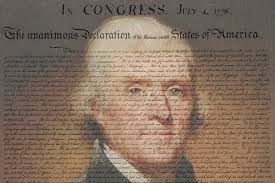Owens wrote on the page that Jefferson's values "aided in the construction of institutionalized racism and justified the subjugation of black people in the United States."
歐文斯在請(qǐng)?jiān)笗?shū)上寫(xiě)道,杰斐遜的價(jià)值觀“會(huì)助長(zhǎng)制度化的種族主義的建立,并認(rèn)為美國(guó)黑人的征服合理。”
But historian Annette Gordon-Reed, who was the first African American to win the Pulitzer Prize for history for her work on Jefferson, says the Founding Fathers should not be lumped together with Confederate generals.
但是歷史學(xué)家安妮特·戈登·里德表示不應(yīng)該把開(kāi)國(guó)元?jiǎng)缀湍喜堪盥?lián)的將軍們放在一起。安妮特是第一位因研究杰斐遜獲得普利策歷史獎(jiǎng)的非裔美國(guó)人。
"Members of the Founding generation should occupy a different place in our minds than the Confederates," she told Newsweek. "There is a big difference between being a person who helped create the United States, and being a person who worked to destroy the United States."
她對(duì)新聞周刊說(shuō):“在我們的心中,建國(guó)一代的成員們應(yīng)該占據(jù)一個(gè)不同于南部邦聯(lián)的位置。”“幫助創(chuàng)造美國(guó)的人和致力于摧毀美國(guó)的人存在很大區(qū)別。”

Dr Clarence Jones—who helped Martin Luther King Jr. write his "I Have A Dream" speech—has taken a similar stance. Neither Washington nor Jefferson should be judged as harshly as Confederate figures because they devoted their lives to "saving and founding this country," he told the BBC in 2017.
幫助馬丁·路德·金撰寫(xiě)“我有一個(gè)夢(mèng)想”演講稿的克拉倫斯·瓊斯博士也采取了類(lèi)似的立場(chǎng)。華盛頓和杰斐遜都不應(yīng)該像南部邦聯(lián)的人物那樣受到嚴(yán)厲的評(píng)價(jià),因?yàn)樗麄儷I(xiàn)身于“拯救和建立這個(gè)國(guó)家,”他在2017年對(duì)英國(guó)廣播公司表示。
"Sure, George Washington and Thomas Jefferson owned slaves," he said.
“當(dāng)然,喬治·華盛頓和托馬斯·杰斐遜擁有奴隸,”他說(shuō)。
There was no question, he added, that they were "morally compromised" in their efforts to build a nation based on the principles enshrined in the Declaration of Independence.
他補(bǔ)充道,毫無(wú)疑問(wèn),他們致力于根據(jù)《獨(dú)立宣言》所載原則來(lái)建設(shè)一個(gè)國(guó)家的行為是“道德敗壞的”。
"But neither of those two persons led the nation in treasonous insurrection to overthrow the government they had formed in order to preserve the institution of slavery. Period."
“但這兩個(gè)人都沒(méi)有領(lǐng)導(dǎo)國(guó)家進(jìn)行叛國(guó)暴動(dòng),推翻他們?yōu)榫S護(hù)奴隸制制度而組建的政府。”
"He did not live up to the ideals of the Declaration."
“他沒(méi)有實(shí)現(xiàn)宣言的理想。”
It was Jefferson who penned the famed words in the Declaration of Independence—ones that most Americans know by heart: "We hold these truths to be self-evident, that all men are created equal, that they are endowed by their Creator with certain unalienable rights, that among these are life, liberty, and the pursuit of happiness."
正是杰斐遜在《獨(dú)立宣言》中寫(xiě)下了大多數(shù)美國(guó)人心中都知道的名言:“我們認(rèn)為下述真理是不言而喻的:人人生而平等,造物主賦予他們?nèi)舾刹豢蓜儕Z的權(quán)利,其中包括生命、自由以及追求幸福的權(quán)利”
But those rights weren't extended to all and Jefferson certainly didn't believe all men were equal—and that is something that is rarely touched on in classrooms.
但這些權(quán)力并未普及到所有人,杰斐遜當(dāng)然也不相信所有人都是平等的,這是課堂上很少涉及的問(wèn)題。
譯文由可可原創(chuàng),僅供學(xué)習(xí)交流使用,未經(jīng)許可請(qǐng)勿轉(zhuǎn)載。












